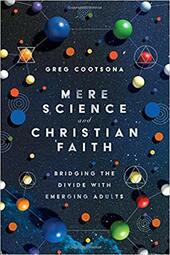One of the things that my teens most enjoy talking about is science and faith. Note that I said talking about; Not debating. Having facilitated this conversation a number of times in the past, I wanted to freshen up my approach with some fresh fodder. I found what I was looking for in Greg Cootsona’s Mere Science and Christian Faith .

In Mere Science and Christian Faith, Greg explores topics ranging from creation, to Adam & Eve and Intelligent Design, to Technology and Hermeneutics. He offers a fresh perspective on each, including some research he conducted with his team at the Science for Students and Emerging Young Adults at Fuller. Quotes from his team’s interviews are scattered throughout this book, which he calls a manifesto for pastors and emerging-adult ministry leaders. To them he says, “My hope is that you’ll do something as a result of reading the pages that follow – that you’ll write some new, true narratives that integrate Scripture and science and that will speak to emerging adults.” Because of its target audience, Greg also takes time early in Mere Science and Christian Faith to help his reader understand who today’s emerging adults are.
From the beginning of Mere Science and Christian Faith, Greg establishes that science and faith are not at odds with one another, but rather contribute to understanding one another. In his words, “The love of the surprisingly intricate beauty of nature is the beginning of science. This experience is intuitive in our early years of life – God created the world; let’s figure out how to understand it.”
One of my favorite chapters in Mere Science and Christian Faith is actually “On a Crash Course with Hermeneutics.” In it, Greg gives a great primer on hermeneutics and reminds his reader that “Christians through the ages have argued that our interpretation of the Bible needs to be updated and correlated with good science.” He then raises three key questions on creation (1. What do we mean by the teaching that God create the world? 2. How long are the 6 days of creation? 3. All in all, what is the Bible designed to do?) designed to help readers understand how their hermeneutics impact their understanding of faith and science.
Finally, I also really appreciated Greg’s exploration of technology – a conversation that often gets very negative in the faith world. Yet, in Greg’s case, he instead remains positive while at the same time raising critical concerns like this one: “If using technology decreases our empathy, and empathy is correlated with faith, maybe technology decreases our capacity for spiritual life.”
All in all, I’d highly recommend Mere Science and Christian Faith. Although I’m quite confident this book isn’t on most youth pastor’s radars, it should be. Reading it will help youth workers and pastors learn how to effectively help teens in their congregations wrestle with faith and science.
***********************************************
Thanks to InterVarsity Press for graciously sending me a copy of Mere Science and Christian Faith to review. All opinions are my own.